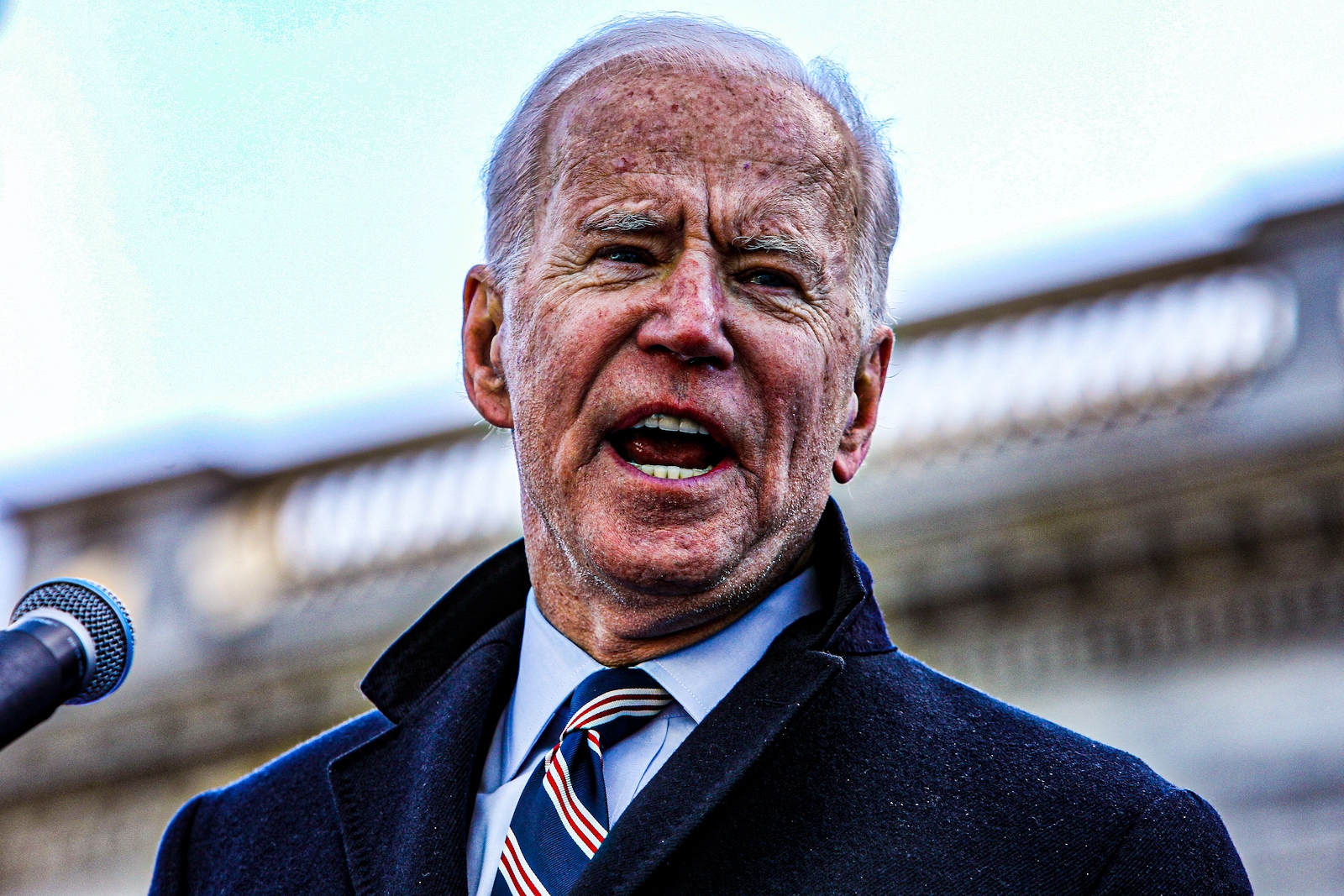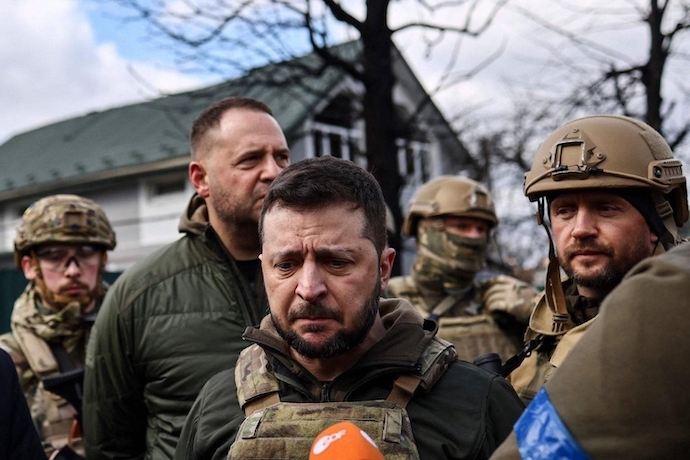
Politics
Republicans are ‘Out Hawking’ Biden on Ukraine
President Biden faces enormous pressure to respond to the ongoing Russian invasion of Ukraine; there is immense pressure from the left, the right, from allies and partners, and from the general public. A recent Pew Research Center poll demonstrated that 35% of Americans “favor U.S. military action even if it risks nuclear conflict with Russia.” Public opinion, as expressed most often through the actions of the U.S. Congress, has a unique effect on the course of American foreign policy. However, the sheer outpouring of public support for the Ukrainian cause is increasingly tying the hands of the Biden administration in its options to respond to the crisis.
Historically, congressional control and involvement over foreign policy has been robust, yet relatively unified behind the leadership of the executive. The usual trope that “politics stops at the water’s edge,” was a trope for a reason. However, during and after the Vietnam War, congressional action increasingly responded to and reflected public opinion about foreign policy. The War Powers Act of 1973 allowed Congress to rein in presidential military action and has been utilized multiple times since its passage.

In both Libya and Syria, Congress used its prerogative and interpretation of public opinion regarding the use of military force to influence, and in this case, to prevent such use. After 9/11, public opinion, pressure, and the necessity to act encouraged military action in Iraq and Afghanistan and discouraged dissent by members of Congress. Despite a near-unanimous vote in Congress, members held a variety of views and opinions about what intervention should look like. These views, which are an important part of the congressional oversight process, were muddied and largely ignored for years due to the exigency of action and the public pressure to act.
Covert and clandestine action has historically been one of the most dynamic, flexible, and creative actions in the American intervention toolbox. Despite well-known foibles and mishaps, covert action allows the United States to pursue foreign policy interests and goals without the usual risks associated with military intervention. Such risks like attributability and escalation are protected by the secrecy covert action provides. Actions that include everything from arming Libyan rebels to offensive cyberspace operations are examples of American covert action.
Covert action provides flexible tools with which to conduct secretive, deniable, and creative intervention. These tools provide a different type of response that is somewhere between inaction and military engagement. However, due to the public support of the Ukrainian cause, everyone from President Biden to the most junior members of Congress hopes to take advantage of the electoral benefits of responding to the Ukrainian crisis.
This desire to demonstrate a response to the Ukrainian war was evident when Senator Rubio (R-FL) and Senator Daines (R-MT) tweeted photos of a Zoom call with Ukrainian President Volodymyr Zelensky despite being asked not to by the Ukrainian ambassador. Everyone wants to be seen responding to the situation in Ukraine; this likely precludes effective covert action options. Leaders hope to use and loudly advertise any and all actions taken in order to demonstrate their support for the Ukrainian cause.
Disappointed that the Biden admin continues to refuse to take steps to help send MiG 29 fighter jets to Ukraine. Ukraine says they need them badly to defend themselves & Poland has offered to donate them as long as we sell Poland more planes to backfill their needs.
— Rob Portman (@senrobportman) March 20, 2022
Further, it is in the interests of elected Republicans to use this issue as a wedge to draw a contrast between Republicans and President Biden. Republican members of Congress are advocating aggressive action to this crisis, going above and beyond what the Biden administration publicly supports. Republicans like House Minority Leader Kevin McCarthy (R-CA) and Senate Armed Services Committee Ranking Member Senator Jim Inhofe (R-OK) both called on the Biden administration to send more arms as soon as possible to the Ukrainians.
Individuals like Rep. Elise Stefanik (R-NY) stated “Joe Biden has met President [Zelensky’s] requests for assistance with weakness and delay.” Senator Portman (R-OH) criticized the Biden administration for not supporting the transfer of MiG 29 fighter jets from Poland to Ukraine. These attempts to go above and beyond President Biden’s actions do not weigh the strategic risks and advantages of taking such action.
Many scholars have discussed in detail the risks involved in escalating our involvement in Ukraine. Dr. Christopher S. Chivvis, a former U.S. intelligence official for Europe, has written at length about the risks involved with proposed no-fly zones as well as about the risks of escalation involved when confronting a nuclear-armed power. Others have discussed the importance of providing off-ramps for Russian President Vladimir Putin; these off-ramps allow the Russian regime to save face and de-escalate the situation in the aftermath of this conflict. Ultimately, the goal of such off-ramps are to ensure Ukrainian sovereignty, prevent more death and destruction within Ukraine, and reduce tension between the West and Russia.
However, the perverse electoral incentives to “out hawk” President Biden may preclude many of these off-ramps from being utilized. Because Republicans are encouraged to use any presidential response to the Ukrainian crisis as a cudgel with which to criticize Biden, there will likely be staunch criticism from Republican leaders if sanctions are removed as a diplomatic carrot to ameliorate the situation.
It is also easy to imagine harsh criticism of Biden by elected Republicans should he support a negotiated peace settlement that stops the shooting but cedes territory to Russia. One can imagine the intense domestic pressure on President Biden to fund and support a Ukrainian insurgency should the country’s military efforts fail, despite the escalatory risks of such action. These electoral incentives affect Biden as well; actions like President Biden’s recent remarks calling Vladimir Putin a war criminal or calling Russian actions genocide are ways to up the rhetorical ante to reflect public opinion. All situations demonstrate the extent to which the Biden administration’s hands are becoming tied by electoral considerations.
Understanding domestic politics and public opinion allows us to understand the forces shaping ongoing crises. It is important that policymakers preserve freedom of action in responding to this crisis, avoid war with a nuclear-armed state, and seek peace to prevent further death and destruction across Ukraine.
